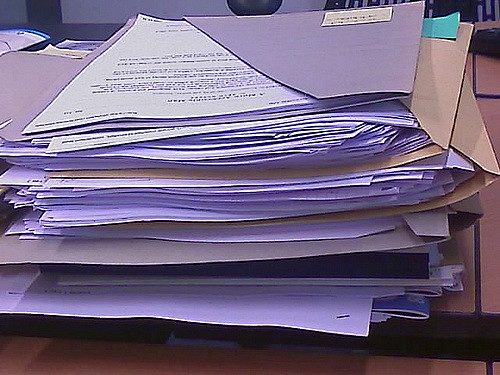
 A common concern when starting a dissertation or research project is collecting enough data. This tends to be a concern whether you are collecting primary data (data you generate yourself from experiments, questionnaires, interviews, field work) or secondary data (data generated by other people, such as previous research findings, government reports, business figures).
A common concern when starting a dissertation or research project is collecting enough data. This tends to be a concern whether you are collecting primary data (data you generate yourself from experiments, questionnaires, interviews, field work) or secondary data (data generated by other people, such as previous research findings, government reports, business figures).
But it is also really important to consider how you will organise, store, and keep track of your data as you collect it. Good data management strategies:
What do I need to collect?
Good data management starts by collecting suitable data to answer your research questions. Gathering data that is fit for purpose means your analysis will be more efficient, and prevents you from becoming overwhelmed by having to process a lot of irrelevant information. When designing your data collection methods, look back at your research question(s) and keep asking yourself: How will the information I plan to collect help me answer these questions?
For further information about different research approaches and how to write the method chapter, have a look at our methodologies video below
Ethics forms
If you are gathering data that involves human subjects, it is likely you'll need to fill in an ethics form which will ask you to consider issues such as the confidentiality of your participants. Your project supervisor or department should be able to advise you on the type of ethics form you need to complete. Plan ahead to complete the ethics form in good time as it may need to be approved by a departmental committee, and you won't be able to start collecting your data without it.
Be clear on the statistical tests you need to run. For more information and support see our Maths Support guide.
Storage
Keep your electronic files on the University network (N drive) as it is reliable and backed up.
If you are storing data directly on your own laptop or PC outside the University network, make sure you have a rigorous backup system in case your device crashes, or is lost or stolen. Use an external hard drive or USB stick and save your data regularly. Have a safe place to keep your USB stick or hard drive and remember to take it with you when you leave the library!
 A cloud service such as Dropbox (link below) can automate backups for you and is accessible online anywhere. Dropbox is suitable for sharing files and short-term storage or backup for any newly-written documents before they can be saved to a more secure location. Public cloud services, like Dropbox, are not suitable for personal or confidential data.
A cloud service such as Dropbox (link below) can automate backups for you and is accessible online anywhere. Dropbox is suitable for sharing files and short-term storage or backup for any newly-written documents before they can be saved to a more secure location. Public cloud services, like Dropbox, are not suitable for personal or confidential data.
Security
Collect the minimum amount of personal data necessary and avoid collecting any personal information that you don't need.
Store any personal data in an appropriate, secure location, e.g. a locked filing cabinet, or password-protected or encrypted online files.
Avoid sending or storing personal data over unsecure networks such as via email or in cloud services like Dropbox.
Process and safely destroy any personal data as soon as they are no longer needed, for example promptly downloading and saving interview recordings from your phone or recording device into a password protected file.
If you have said on your ethics form that you will be annonymising data (e.g. interview responses) to protect participants' confidentiality, make sure you do this. Have a system for anonymously labelling each response such as assigning a letter, number, or changing their name (Participant A, Interviewee 1, 'Johnny').
Organisation
Have a systematic and clear way of naming your online files and, most importantly, stick to it!
You should be able to tell what's in a file without opening it.
Including a date formatted like YYYY-MM-DD means you can sort files chronologically
Having a version control number means you can easily distinguish between your 1st, 2nd, or 10th draft!
|
For example: 2015-07-05_InterviewRecording_ClassroomAssistant A 2015-07-01_InterviewRecording_TeacherB 2015-06-12_InterviewRecording_TeacherA Or: MethodsChapter_Draft 1_2015-07-10 MethodsChapter_Draft2_2015-07-11 |
Store your electronic files in a logical folder structure to make them easier to locate and manage, e.g. creating folders to group files according to content type, activity, or date. For further examples see guidance from the UK Data Service (link below).
Also have a system for safely storing any field notes. You don't want to lose vital parts of your research on site or in an unfamiliar library that you won't be returning to. Simple systems are the best, for example putting things in box files is easier than having to find a hole-punch and ring binders.
Documentation
As well as making good notes from the books and journal articles you read (including the full bibliographic details for your references) it is also important to keep clear records of other parts of your research process:
 Keeping your data
Keeping your data
If you have the opportunity to continue with similar research, for example in a postgraduate degree, or present it to a public audience, such as at a conference or in a journal paper, it is good practice to keep your data in case fellow researchers want to access it; your project supervisor can help advise you about this.
In most cases, though, for undergraduate research projects it is very unlikely you will have to store your data after you have graduated. However, before you rush off to burn your notes, it is a good idea to keep everything safely until you have your final marks, just in case!
Advice adapted from the University of Reading's Research Data Management pages.